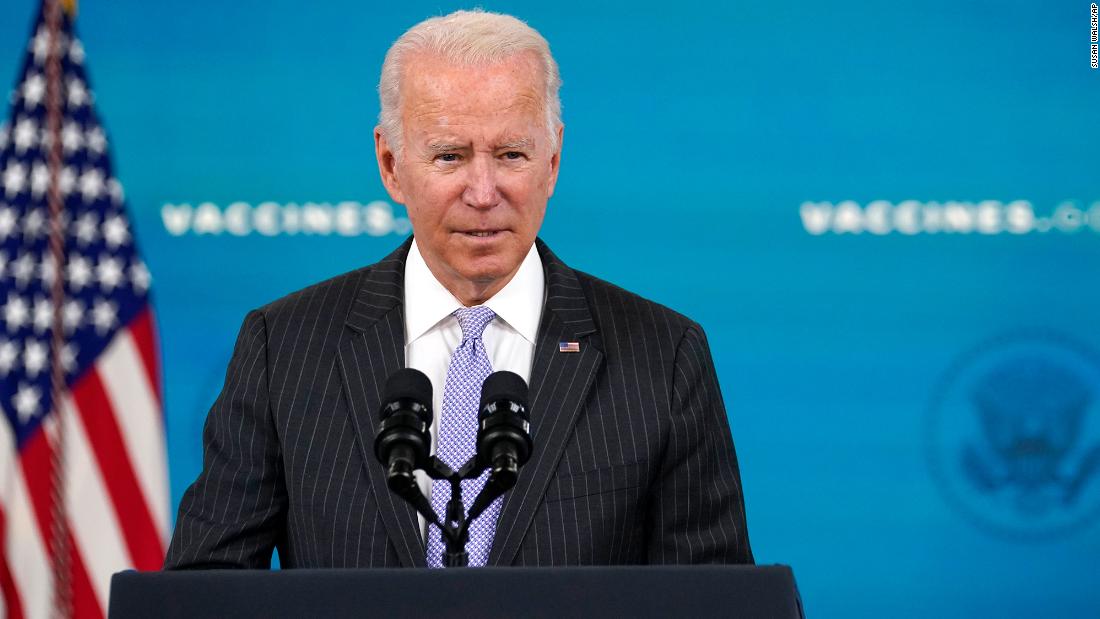Analysis: Biden must first beat the pandemic to keep Republicans out of power
The most chronic stage of the Covid-19 nightmare seems to be ending, with new infections and deaths falling significantly. But President Joe Biden and other Democrats badly need a fundamental transformation of the political environment in the 12 months remaining before the midterms, and that looks unlikely if the pandemic — and its cascade of economic anxiety — is still here in some form. There is nothing more fundamental to basic life and voter sentiment than buying food and gasoline.
But if the country gets a grip on the pandemic, inflation is lower, the labor market is healthier and shop shelves are full, voters may be in a sunnier mood by November 2022. If the virus is circulating at low levels and there’s no need for vaccine mandates and masking, Biden should be able to put in the past controversies that are instrumental in generating conservative fury — and in getting Trump’s base to the polls.
A Biden adviser told CNN’s Jeremy Diamond after their poor showing in Virginia that while Democrats must show action and cannot just run against Trump all the time, there is hope within the President’s circle that the treacherous political environment could ease next year. The pandemic is waning and there is a growing belief that congressional Democrats will soon pass both the President’s bipartisan infrastructure bill and the social spending blueprint, the adviser said. Still, with polls showing that many Americans are not familiar with the latter plan’s mix of funding for health care, education and climate change mitigation, the party needs to mount a major public relations campaign once the measures pass.
Biden vowed to ‘end this’ but pandemic is not yet over
But even if the worst national health crisis in 100 years is beginning to fade as the priority political issue, its threat is at the core of many of the other influences shaping America’s always-changing political map.
Many of the current drags on the economy can be traced directly to the crisis. Some Americans haven’t returned to work or were slow to do so because they couldn’t get child care when schools were closed. The summer Delta variant spike slowed the momentum of the recovery after earlier infectious waves, and along with the chaotic withdrawal from Afghanistan — another issue where Biden’s comments didn’t seem to match reality — helped drive the President’s approval ratings down.
Biden did make a show of addressing the supply chain crisis several weeks ago and secured 24/7 opening at the Port of Los Angeles to help get backed-up containers off the docks. But he admitted in a recent CNN town hall that he can’t do a lot about gas prices, and his transportation secretary, Pete Buttigieg, recently said on CNN that the supply chain issues may linger into next year. Such comments hardly give the public the impression that the White House is focused relentlessly on this issue every day — even if such an effort could be as much a public relations exercise as a decisive intervention that could fix the problems.
Youngkin’s well-executed campaign in Virginia exploited the vacuum, stressing the economic concerns shared by many in the state and, since Democrats control Washington, put his opponent, Democrat Terry McAuliffe, on the defensive. The commonwealth’s next Republican governor plans to abolish the grocery tax. And even his offensive on education — simmering with implicit messages on race and transgender rights to appeal to Trump voters — got more purchase than it might have because of broad frustration among parents at months of pandemic-fueled closures. Youngkin also came out against vaccine mandates for schools and state workers. And the political toll of pandemic leadership — of being the face of restrictions and closures — may well have hurt Murphy in New Jersey, where there was high turnout in areas that oppose those measures.
‘Incredible progress’
“After almost 18 months of anxious worrying every time that your child had a sniffle or started to cough, well, you can now protect them from this horrible virus,” the President said at the White House.
The administration is under pressure to swiftly and competently manage the rollout for kids’ vaccines. While Thanksgiving and Hanukkah will come too early for the two-dose vaccine to banish memories of last year’s dark holiday season, millions of American kids could be fully protected by Christmas.
If history is any guide, however, a breakthrough in the public health offensive against the virus will spark a new eruption in the partisan showdown that has lengthened the pandemic. Conservative media will brim with misinformation about vaccines and government regulatory trials that say they are safe and effective for kids. Multiple polls have shown that millions of parents say they won’t let their children get the shots, even though inoculations for other diseases are standard for school attendance from a young age. A backlash would mirror earlier hostility among conservatives over masking, vaccines and mandates throughout the pandemic, all of which have contributed to successive waves of infection and hundreds of thousands of deaths. The US death toll passed 750,000 on Wednesday and many of those lost could still be alive had public health guidance been followed.
Controversy over child vaccines would also underscore that the President’s biggest obstacle in his quest to end the pandemic — or at least to reduce it to an endemic threat rather than a constantly raging crisis — is posed by some Americans themselves. As Tuesday’s results show, incumbent parties and leaders like Biden end up paying the price for the long and devastating economic and social half-life of Covid-19. And in some ways, Biden’s fate may lie in the hands of the very voters most likely to oppose him next year — those who are most likely to ignore government public health advice. Voters may look to Republicans in the longer term if the fallout from the pandemic persists.
![]()


